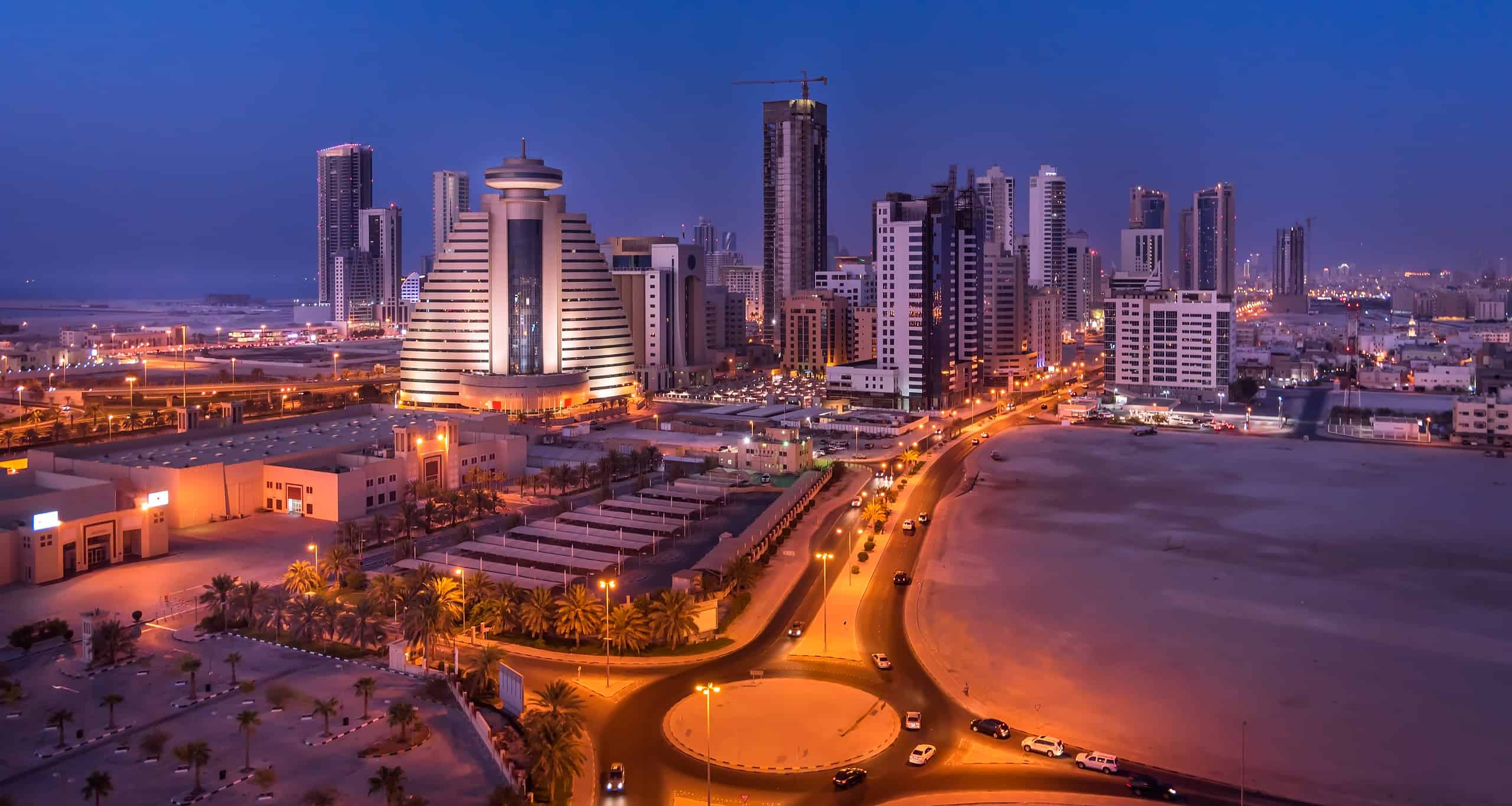Bahrain has big plans for development, and investors are interested. But its geographic position is both a blessing and a curse.
Bahrain was once favored to be the leading financial center of the six-member Gulf Cooperation Council (GCC). Dubai has since seized the title, and other jurisdictions in the region—including Abu Dhabi, Qatar, and most recently Saudi Arabia—have all launched initiatives to become financial hubs.
Questions about Bahrain’s dependence on hydrocarbon revenue, the pace of economic diversification, debt levels, and its place in the GCC’s geopolitical matrix continue to thwart the island kingdom’s ambitions.
Still, earlier this year, Bahrain was ranked No. 1 globally for Islamic finance regulation in the ICD-LSEG Islamic Finance Development Report. Efforts to attract foreign direct investment are also progressing. In 2022, the latest period for which data is available, FDI inflows reached $2.76 billion, a 55.2% increase over the previous year, according to the Bahrain Economic Development Board claims.
Retaining institutional confidence is a priority for policymakers. In February, Bahrain’s government tapped bond markets to meet looming debt repayments, issuing a seven-year sukuk—an Islamic financial instrument compliant with Shariah principles—and a 12-year conventional bond, each worth around $1 billion, taking advantage of lower US Treasury yields and narrower spreads.
Investors have bought into Bahrain’s story, at least for now, says Franck Bekaert, an emerging markets analyst at Gimme Credit. “The spreads of Bahrain bonds are already very tight, and the Middle East’s geopolitical tensions are still ongoing,” he notes.
Last year, Bahrain’s budget deficit stood at only about 2.5% of GDP, but the gap is expected to widen this year, London-based Capital Economics warned in a February note. Around $2 billion in Eurobond principal repayments fall due in 2024, and a more onerous repayment schedule looms in the following years. At its peak, Bahrain’s debt-to-GDP stood at 100.5%. Although it has since fallen to 89%, it remains a hefty burden.
Implicit in retaining investor confidence is the kingdom’s ability to call upon other Gulf states, notably neighboring Saudi Arabia, for financial support, suggesting that the risk of sovereign default remains low, Capital Economics says. Some analysts are hopeful Bahrain will continue to liberalize its economy and finally secure its position as a key GCC economy, but the emerging consensus is that further reforms are needed.
It’s Still About Oil
Despite not being a member of OPEC+, Bahrain shadows the cartel’s policy. Oil accounts for more than 70% of Bahrain’s government revenue, according to the US Department of Commerce, and planned output cuts will weigh on the country’s growth prospects this year, including in the non-oil sector. Even so, with GDP projected to increase around 3% year-on-year, Bahrain is tied with the United Arab Emirates (UAE) as having the strongest growth prospects in the GCC, Capital Economics estimates.
Oil’s existentially important contribution to Bahrain’s economy underlies the government’s plans to double down on investment. While the UAE recently hosted COP28, which underlined global concerns with the impact of fossil fuels on climate, Bahrain, with US support, aims to dramatically expand oil and gas production.
The US Export-Import Bank is backing Bahraini proposals to drill more than 450 new oil and gas wells as part of a $4.2 billion program to boost production following the discovery of new reserves in 2018. Pumping oil and gas from the enlarged field is forecast to belch out more than 1.4 million tons of CO2 a year by 2026, double the level of 2022.
Nascent attempts to diversify the economy have yielded mixed results, leaving the kingdom little choice but to increase capacity. Still, the government remains mindful of its environmental obligations, says Ujjwal Deb, vice president of Energy and Commodities at Publicis Sapient. “They need to drill for more oil and increase their refining capacity by two-thirds,” he estimates, “which they are planning to do in conjunction with carbon-capture tech to avoid breaching their 2060 net-zero goals.”
The Private Sector’s Role
Bahrain nonetheless remains attractive to investors. Manufacturing accounted for 17% of FDI in 2022. And in January, Conexus Resources Group, a UK company active in metals and agricultural commodities, inaugurated a $100 million, 32,000-metric-ton-capacity aluminum plant.
The government is also hoping that an early embrace of cloud technology, which saw Bahrain adopt a national “cloud first” policy in 2017, will reap dividends over the next few years. A report by International Data Corporation predicts cloud spending will contribute over $1.2 billion to the kingdom’s GDP by 2026, roughly equivalent to 23% of total GDP. Already in 2019, Amazon Web Services chose Bahrain to host the first AWS Region in the Middle East and North Africa. China’s Huawei has its Middle East and Central Asia headquarters on the island, as well.

Advisors: Centralized decision-making
can impact support for public finances and
economic growth.
Bahraini companies, meanwhile, are accelerating plans to increase offshore investments. Investcorp, a Bahrain-based alternative asset manager, is raising between 2 billion and 4 billion yuan (around $274 million to $548 million) for its first-ever private equity fund in the Chinese currency. Investcorp’s CEO said in November that the firm intends to apply for a license from Chinese authorities to begin raising funds from domestic institutions.
Ambitions to grow the economy prioritize nurturing non-oil sectors such as tourism, financial services, manufacturing, transport and logistics. Together with plans to develop innovation and entrepreneurship, they form the bedrock of Bahrain’s venture-capital ecosystem. Mumtalakat, the kingdom’s sovereign wealth fund with some $18 billion in assets, is leading these efforts, investing in companies and sectors aligned with the government’s diversification goals, notes Michael Ashley Schulman, partner and CIO at Running Point Capital Advisors.
Bahrain is also keen to tap rising trade flows between the Middle East and China. Tourism looks set for a boost, with the announcement of direct flights between Bahrain, Guangzhou and Shanghai. And the GCC is hoping to seal a free-trade deal with China that would potentially expand bilateral trade. Aside from China’s capacious demand for oil, Beijing has highlighted the GCC’s allure for inclusion in President Xi Jinping’s Belt and Road Initiative.
What Investors Want
Despite limited results thus far, Bahrain is betting big on diversifying its economy. The government is now executing a multiyear economic plan that aims to attract over $30 billion in strategic investments to enhance non-oil growth, notes Schulman, who expects a tilt toward investments as opposed to direct government aid, which is hampered by debt obligations.
The Fiscal Balance Program (FBP), designed to reduce government expenses and achieve fiscal balance, “has bolstered fiscal policymaking, though fiscal flexibility remains constrained due to high debt levels and reliance on oil revenue,” Schulman says.
The updated FBP includes a statement of support from Bahrain’s GCC partners, who note that the GCC development fund will continue to undertake capital expenditure projects in Bahrain, Fitch Ratings said in August. Even so, Schulman argues the government will have to reduce layers of bureaucracy—intrinsic in a government appointed by the king—to achieve its goals.
“Centralized decision-making can impact support for sustainable public finances and balanced economic growth,” he says.
Equally crucial is simplifying regulations and procedures in order to create a dynamic business environment that attracts and retains international companies, says Yusuf Mansawala, chief market analyst at CPT Markets. But Bahrain must also upskill its workforce.
“Investing in the development of human capital is essential to equip its citizens with the expertise needed to compete in the global market,” Mansawala says.
A Region On The Edge
Bahrain’s location at a strategic crossroads is both a blessing and a curse to its investment and development aspirations. China’s interest in the Gulf region is quasi-political, including a need to keep oil flowing. The Strait of Hormuz is a vital conduit for Bahrain’s oil exports, but the recent rise in tensions as a result of the conflict between Israel and Hamas and the Houthi attacks on shipping has brought the region to the brink. In 2020, Bahrain and the UAE were the only GCC members to agree to normalize relations with Israel in what became known as the Abraham Accords.
Last year, Israel opened an embassy in Manama. But unlike the UAE, Bahrain has seen little economic benefit from the rapprochement. As home to the US Fifth Fleet, a defensive backstop against Iran’s regional ambitions, Bahrain walks a political tightrope.
The kingdom also needs to reassure investors of its long-term viability. While it has avoided major unrest, protests over Israel’s policy in Gaza have spilled over into the streets. Prior to the latest conflict, the World Bank awarded Bahrain only a 30.66 percentile rank for political stability in its 2022 Worldwide Governance Indicators (a score of 100 corresponds to the highest rank).




